| |
| |
|
|
| |
FAQ - Frequently Asked Questions
|
 |
Do Hydraulic winches burn out the power steering pump? |
|
|
If you take the example of a Land Rover power steering pump, during rough off-road driving the shock loading on the power steering system is quite high and the fluid can and does get hot, mainly due to intermittent pump overload. However the heat can easily be dissipated through the circulating fluid and it rarely causes a problem. If this power steering pump is driving a MileMarker winch motor, there is no shock loading, because the pull may be hard but it is steady and pump overloading occurs only once at the most. Therefore the heat generated by the winch is even lower than during off-road driving. In some cases where we know the winch is powered from a high flow pump and it is going to be working all day long we recommend that a small oil cooler is fitted. This is more of a rumour, as I hear it wherever I go, but no one knows when it has actually ever happened. |
|
|
|
50 % of people have found this faq helpful - what about you?  
|
 Back To Top Back To Top |
|
|
|
 |
How do I choose the right winch for me? |
|
|
Firstly, You should take your vehicles GVM(Gross Vehicle Mass). So fill up your gas tank, load up all those off-road goodies, tools, hi-lift jacks, people and go get your vehicle weighed. Take your GVM and multiply it by 1.5 to determine which winch is right for you. We do this to in order to overcome the resistance from mud or an incline. Don't forget to take into account that 12% drop in pulling power for every extra wrap of cable on the drum - a 9000lb winch has a line pull of approx. 7000lbs on the third wrap.
Secondly, You should decide whether Hydraulic or Electric best suits your needs. If you are planning on doing expeditions into remote areas and reliability is your biggest factor then defiantly Hydraulic is what you need. If you only use your winch occasionally for short periods, and are in a place where you can call the AA or a friend to pull you out then an electric winch is what your looking for. |
|
|
|
47 % of people have found this faq helpful - what about you?  
|
 Back To Top Back To Top |
|
|
|
 |
Should I use Synthetic winch ropes? |
|
|
The use of non-wire ropes is a fast growing trend amongst off-roaders. They were originally employed for safety reasons, on the basis that when they broke their low mass caused them to drop to the ground, rather that take your hand off. Other attributes are that they are easier to handle, possible to repair by splicing, when they break and the 10kg or so weight saving on front overhang meant that had less of an effect on the vehicles handling, compared to the heavier wire rope. However, there are a few disadvantages.
1. They are quite expensive, costing about 3-4 times that of one of our wire ropes.
2. They cut easily and generally have poor resistance to abrasion.
3. They are sensitive to heat, with deterioration beginning at just 60C and can even melt with excessive drum heat or friction.
4. Under extreme loads they can generate even massive side loads. I.e. up to 55 tonnes from a 4.5 tonne pull.
Now the problem of cost is a personal one, you pays your money and makes your choice, but points 2, 3 and 4 can be avoided by careful and correct winch practice.
1. Change the roller fairlead to a "hawse" type, as the frame of the roller fairlead can cut the rope. Then protect the rope from sharp or rough objects at all times.
2. If you have a planetary type electric winch drum heat is your problem, however, the H12 produces virtually no drum heat as the motor runs cooler and importantly braking is carried out remotely at the control valve. Correct spooling, as described below will help prevent frictional heat.
3. To avoid the "log-splitting" effect and the consequential jamming, friction and excessive side load problems, avoid spooling the drum neatly and in a parallel fashion, as is recommended for wire ropes. The first layer should be put on under load (around 500kg) to capstan it on to the drum, all subsequent layers should be fed on tightly in a criss-cross manner so that each layer is at an angle of about 30 degrees to the layer below. This will prevent the upper layer from finding their way to the centre of the drum through the upper layers.
The effect of this rough spooling is that the drum will be filled more easily, so for the H12 we recommend 27 metres of 3/8* diameter rope (either 9 of 10mm if the rope is metric) and spliced 4 times, with a proper taper lead.
If you are just learning to winch, my advice would be to start with a wire rope and change to synthetic when you are confident you know what you are doing. I have seen people wreck a 200 rope on their very first pull, a wire rope is much more forgiving, more difficult to damage and cheaper to replace. |
|
|
|
49 % of people have found this faq helpful - what about you?  
|
 Back To Top Back To Top |
|
|
|
 |
What if a Hydraulic system blows? |
|
|
We have had the question of when a car tyre blows out it can be quite dramatic and even dangerous and it is only pressurised to 2bar (30psi). A hydraulic winch operates at up to 100bar (1450psi) and with 50 times the pressure isn't this a major hazard?
Answer
No, not at all. The crucial factor is that a hydraulic system has no stored energy, since the hydraulic fluid is not and cannot be compressed. So the much higher pressure that the winch generates is almost irrelevant. It should not be confused with a compressed air system, where the air is greatly COMPRESSED. When such a system suffers a rupture this considerable energy is quickly released often with quite violent results.
|
|
|
|
49 % of people have found this faq helpful - what about you?  
|
 Back To Top Back To Top |
|
|
|
 |
What safety equipment will I need? |
|
|
You just need your leather gloves and common sense. Never handle the cable with bare hands, a frayed cable can cut skin to the bone. The most common winch accident is getting your fingers caught in the cable as the last of it winds onto the drum. Always use the remote control cable when winching, and keep every one out of range of the cable .Be aware that a broken winch cable can have enough force in its whiplash to cut through a truck's roof and windshield. Imagine what would happen if the cable met a person. A cable that hits a small tree will tear the tree down. A cable that hits a large tree can wrap tightly around a tree so a person behind the tree is not necessarily safe. Solid objects such as hooks and snatch blocks will fly through anything, including a truck's hood, if a cable breaks. People should stand well out of range of the cable and never in line with the cable. Furthermore, if a cable breaks, the truck being winched may roll downhill, so never stand downhill of any vehicle being winched. |
|
|
|
52 % of people have found this faq helpful - what about you?  
|
 Back To Top Back To Top |
|
|
|
 |
What`s the difference between electric and hydraulic winches? |
|
|
The basic difference between an electric and a hydraulic winch is the power source. Electric winches link to your vehicle?s battery, and hydraulic winches tap into a Hydraulic pump. These two power sources offer certain advantages and disadvantages:
Electric winches
Advantages
? They are easy to install
? Can be used with the cars engine off, but only momentarily as they put a lot of strain on your battery,
? Much faster than Hydraulic, only under no load.
Disadvantages
? Draws between 3-5kW from your battery, enough to power a small house!
? Uses up power from you battery faster than your alternator can replenish it causing a flat battery if worked hard even with the engine running.
? Faulty electrical connections cause heating which is difficult to locate.
? Generates a lot of heat under load which causes the electrical components to possibly melt/damage.
? Because everything is electrical it?s vulnerable to water damage.
? Higher risk of getting your hand jammed in the winch as their motors continue to pull for about 300mm before the winch stops.
Hydraulic winches
Advantages
? If it installed incorrectly, it is easy to pick up because you will see a leak
? Only draws around 2 horsepower from your engine and 2 Amps from your battery so it is virtually impossible to cause any damage to your Engine Management System which could leave you stranded if damaged.
? have an almost limitless supply of energy from the pump source,
? Reliable, quiet and durable can even be used under water.
? Runs much cooler (Heating is rarely a problem, unless you are continuously pulling close to maximum load and then this is easily cured by fitting a small oil cooler) and will only stall if the maximum pressure provided by the pump is reached(simply reduce load and the winch continues to work immediately)
? Provides a constant pull irrespective of the load its pulling
? Safer to use as they don?t continue to pull when they are stopped.
Disadvantages
? Can not operate if engine is switched off
? Under no load, they are slower that the Electric winches(using standard power steering pump system)
Food for thought: Caterpillar, JCB, and even the Pyramid builders used hydraulic power. Supacat and the US Military use MileMarker Hydraulic winches! |
|
|
|
48 % of people have found this faq helpful - what about you?  
|
 Back To Top Back To Top |
|
|
|
 |
Will my electrical system cope with the extra load of an electrical winch? |
|
|
Running a winch is the equivalent of moving your truck on the starter motor!
Installation of a winch requires the beefing up of the electrical system. You
will require a heavy duty (high output) alternator, capable of at least 100
amps (remember to consider alternator output at idle too, these figures can
differ wildly, especially on older models). Fit a high capacity battery, or
consider a dual battery setup with some sort of electronic battery management
system. If you have other high power devices, sound system, lights etc, you
may want to consider a separate high power wiring loom. Also in case of an
emergency install an easily accessible emergency power cut off switch and
resetable circuit breakers (the winch cables carry enough current to weld 0.25"
steel plate).
After you have got power to the winch you will need to get it back to the battery. Ensure your grounding system is capable and all connections are clean, this is where most systems waste power. The best grounding systems will use large diameter cables (such as welding cables), the battery negative post connects to the engine block, the alternator ground connects to the engine (usually through its case) and then the frame is connected to the engine using a grounding strap.
Remember, compared to your vehicle's other electrical components, winches draw huge amounts of current(around 400Amps) and can completely drain your battery or overload your alternator in a matter of minutes.
|
|
|
|
52 % of people have found this faq helpful - what about you?  
|
 Back To Top Back To Top |
|
|
|
|
| |
|
|
|
|
 Osirion System Technologies
Osirion System Technologies
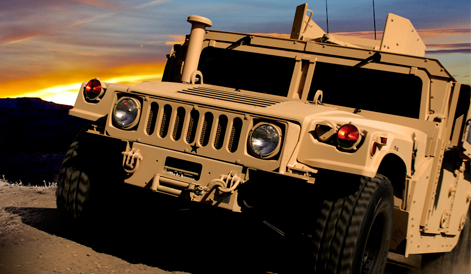
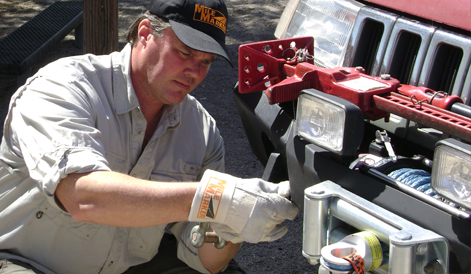
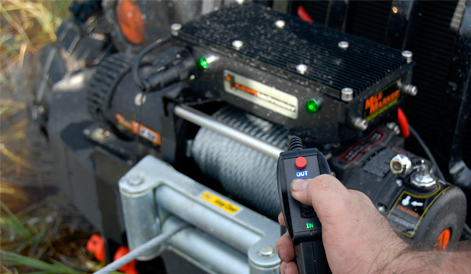
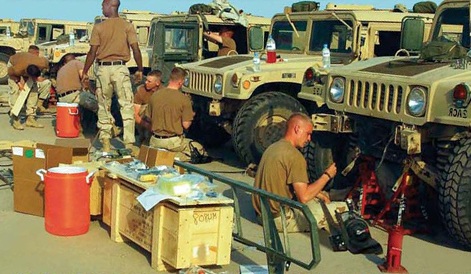
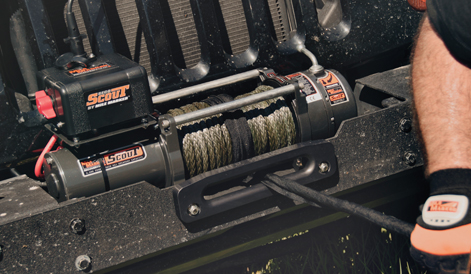



 Back To Top
Back To Top